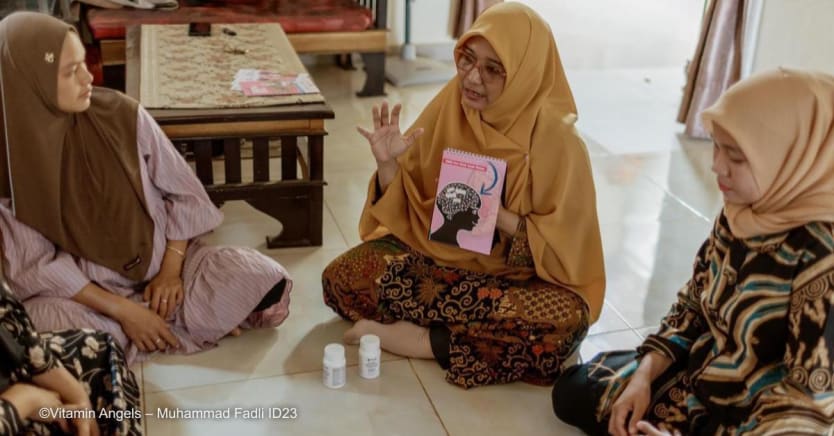
UNICEF’s “Undernourished and Overlooked” report, published earlier this year, brought attention to a concerning rise in acute malnutrition, impacting pregnant and breastfeeding women along with adolescent girls in the 12 countries most severely affected by crises. The numbers have surged from 5.5 million to 6.9 million since 2020, reflecting a substantial 25% increase. The report underscores a global crisis, revealing that over 1 billion adolescent girls and women worldwide are affected by undernutrition.
Malnutrition during pregnancy can lead to a range of adverse outcomes, including low birth weight, developmental issues, and an increased risk of maternal complications. “During pregnancy, the nutritional needs of women increase drastically. Throughout pregnancy, women need up to 50% more nutrients than outside of pregnancy. Oftentimes, they do not have access to many of those nutrients through diet alone, so a supplement is needed,” said Shannon King, implementation science manager at Vitamin Angels — a public health nonprofit organization that coordinates with local and national partners to deliver essential vitamins and minerals to mothers and children at risk of malnutrition.
In a move to improve women's health, the World Health Organization updated their antenatal care guidelines in 2020 to provide specific guidance for the use of UNIMMAP MMS (United Nations international multiple micronutrient antenatal preparation multiple micronutrient supplements) in the context of rigorous research, including implementation research. UNIMMAP MMS is a specific formulation of the supplement commonly known as prenatal vitamins and minerals, referred to as MMS throughout this article. MMS includes 15 essential vitamins and minerals, including iron and folic acid. Research indicates that compared to the current standard of care with iron-folic acid supplements in low- and middle-income countries, MMS further reduces adverse birth outcomes.
Despite best efforts to provide supplements through public health systems, millions of pregnant women around the world still do not have access to MMS. The reasons behind this are multifaceted, said King, adding that addressing them requires a comprehensive approach that involves strengthening health care systems, increasing awareness and education, addressing issues of supply, and implementing targeted interventions to overcome economic barriers to accessing care.
Speaking to Devex, King discussed the primary drivers of micronutrient deficiency in LMICs, actions needed to support transition to MMS, and Vitamin Angels' comprehensive global nutrition strategy.
This conversation has been edited for length and clarity.
How are women and children disproportionately impacted by the effects of micronutrient deficiencies?
Pregnancy and a child’s first five years of life are critical periods of growth and development where nutritional needs are very high. During those periods, the consequences of micronutrient deficiencies are greater — for example undernourished pregnant women are more likely to experience anemia, which can result in severe complications during pregnancy for both the woman and the child. This can result in diminished physical and cognitive development for the child, which can in turn perpetuate a cycle of poverty.
What is Vitamin Angels’ overall approach to addressing malnutrition?
Vitamin Angels focuses on addressing malnutrition among the most vulnerable groups — underserved pregnant women, infants, and young children — by increasing access to proven nutrition solutions. Vitamin Angels partners with over 1,200 local organizations, including governments across approximately 65 countries, to deliver a package of proven nutrition interventions. Additionally, Vitamin Angels delivers technical assistance to expand and strengthen nutrition services within the local contexts where we are working. As an organization, we’re committed to doubling our impact by 2033 — that would be increasing our reach from 71 million to 140 million women and children annually.
What are the primary drivers of micronutrient deficiency in LMICs, and how can interventions be tailored to address these specific challenges?
The two key drivers of micronutrient deficiencies are inadequate diet and care. In general, women and children are not able to access enough micronutrients through a healthy and varied diet alone. There are many evidence-based nutrition interventions (e.g. MMS for pregnant women, promotion of optimal breastfeeding and complementary feeding practices, and vitamin A supplementation for children) that can supplement dietary intake and support health and well-being.

In LMICs, many women and children don’t have access to the care that they need to receive these evidence-based nutrition interventions. That could be due to many reasons, such as lack of access to health care because of the distance, cost, or the supply isn’t available. Therefore, at Vitamin Angels, we work directly with local organizations and governments to ensure that we’re reaching the women and children who are underserved by the existing health care system.
Founded in 1994, Vitamin Angels is a public health nonprofit working to improve nutrition and health outcomes in low-resource settings worldwide. We strengthen, extend, and amplify the impact of our partner organizations working to reach the most nutritionally vulnerable groups — pregnant women, infants, and young children — who are underserved by existing systems.
We do this by delivering evidence-based nutrition interventions and offering technical assistance, including ongoing monitoring and evaluation, to ensure program quality, scale, and impact. Vitamin Angels works with over 1,200 local organizations, including governments, to reach more than 71 million women and children in approximately 65 countries annually.
To learn more, visit: www.vitaminangels.org.
Given global recommendations and guidance, what are some emerging examples of effective implementation of MMS programs, and how are challenges being addressed to ensure broader and more impactful adoption?
Iron and folic acid supplementation has been the standard of care for decades. In 2020, WHO issued a context-specific recommendation for MMS stating that it could be introduced within the context of rigorous research — including implementation research. More than 28 countries have initiated efforts to explore the introduction of MMS within the context of strengthening antenatal services.
As an example, in Indonesia, over the past four years Vitamin Angels has partnered with the national MMS task force, multiple national and local government entities, and selected local universities to explore the introduction of MMS using an implementation science approach that includes implementation research. This includes efforts to strengthen antenatal care services including counseling on MMS, securing a Halal certified UNIMMAP MMS supply initially through donation and subsequently through local manufacturing, and efforts to list MMS on both the national essential medicines list and the national formulary.
What actions do you think the broader health community should prioritize to collectively address malnutrition on a global scale in 2024?
Addressing the food insecurity and hunger challenges faced by pregnant women and young children is critical. Unfortunately, these issues are likely to worsen due to factors such as climate change and conflict. Efforts to deliver an integrated package of proven nutrition services during the time from pregnancy through a child’s fifth birthday are needed to promote optimal health and wellbeing across the lifespan, break the intergenerational cycle of poverty, and limited educational attainment and poor economic gains. A collaborative effort within the global nutrition community is key to improving maternal health and ending malnutrition worldwide.


